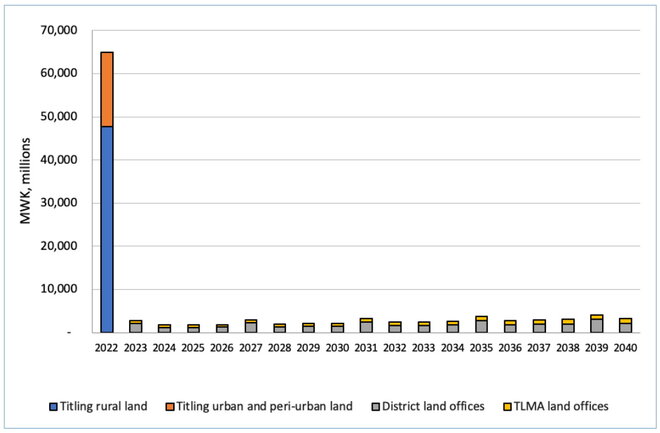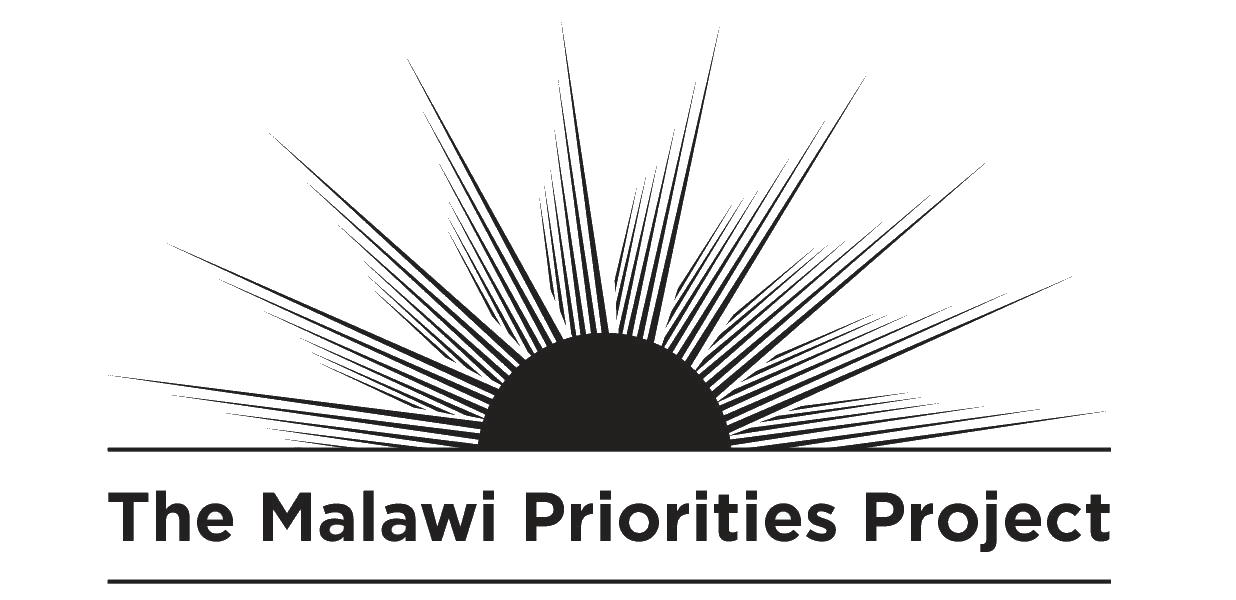Malawi Priorities: Land Tilting
Technical Report
Key Messages
- Malawi enacted a land reform policy in 2016. Implementation has been initiated but there is much work left to do with 4.7 million hectares of land in the country still untitled. Secure land tenure has substantial benefits for Malawians with 15 percent of households having a dispute over land and one out of five households fearing that their land would either be encroached upon or taken away from them.
- Implementing the land reform policy would require MWK 64,920 million in upfront costs for land titling, adjudication, and demarcation of 4.7 million hectares. Ongoing costs for 35 District land offices and 226 Traditional land management authorities (TLMAs) would require MWK 2,700 annually on average for staff, equipment, office space, and utilities.
- Secure land tenure has substantial benefits including increased ability to access credit and investment certainty, reduced costs in land transactions, and lesser conflicts over land possession. The major driver of benefits is an increase in land value because of titling. This is estimated as a 25% and 10% increase in urban and rural land values respectively. The total benefit is estimated to be worth MWK 6,425,313 million.
- The central BCR estimate is 73, making it an excellent return on investment and one of the interventions that could generate substantial wealth in Malawi.
Context
Land reform in Malawi has been a decades-long process. Starting in 1993, efforts have culminated in a series of acts ushered into law in 2016 to ensure increased land security for Malawians. The laws allowed for, inter alia, formal registration of customary lands and a decentralized structure for managing land registration and transfers. Given the relatively recent enactment of these laws and the creation of subsequent plans, much of the land remains untitled, with only a few decentralized offices created for administration. Discussions with the Department of Lands suggest that 3.2 million hectares of rural land and 1.5 million hectares of urban land require titling. Land titling would have significant benefits, with 15 percent of households having a dispute over land and one out of five households fearing that their land would either be encroached upon or taken away from them.
Land reform is an excellent return on investment with the potential for substantial wealth creation in Malawi
There are two primary costs to implement the land reforms: the first is the actual land titling process, the second relates to creating the infrastructure and services to manage land transactions going forward via decentralized offices.
Specifically, to adjudicate, demarcate and register land parcels on the estimated 3.2 million hectares of rural land that requires titling would cost MWK 47,680 million, based on an assumed per hectare cost of MWK 14,900. This figure is based on land titling pilots currently underway in Malawi that utilizes satellite imagery to identify plot boundaries. For the estimated 1.5 million hectares of untitled urban and peri-urban land, the total cost of titling is estimated at MWK 17,240 million, based on a per hectare titling cost of MWK 11,175.
Recurring and ongoing costs include the cost of capacitating and maintaining district land registry offices. Currently, Malawi has only 3 Regional land registry offices in Mzuzu, Lilongwe, and Blantyre which will be disbanded once District Offices are in place. Thirty-five district offices would require salaries for almost 500 staff members, rental costs for around 1000 sq meters of office space plus upfront expenditure for computers, office equipment, and furniture estimated at MWK 1,000 million. Human resource costs were estimated using the official civil service pay grade (Department of Human Resource Development and Management, 2020), while office space was assumed to cost MWK 70,000 per person as documented in the National Resource Management paper. Equipment costs of around MWK 1,000 million are required in the first year and every fourth year thereafter. Office rental, including utilities, is relatively modest at MWK 35 million.
According to law, smaller offices are required at each TLMA to hold land records, of which there are roughly 226 across the country. We estimate the overall cost of these smaller offices at starting at MWK 582 million in 2022 based on rental costs, human resources, and equipment required, rising to MWK 1,098 million by 2040 to account for expected real growth in wages. The costs of educating a cadre of land management and surveying personnel do not need to be factored into the analysis since there is already a surfeit of personnel trained in these disciplines from various universities in Malawi, who are waiting for employment.
As can be seen in the figure, the largest cost is associated with land titling, which reaches MWK 64,920 million with roughly 73% of the cost for titling rural land. Thereafter, the operating costs of running the district and TLMA offices are relatively modest, averaging MWK 2,700 million per year.
The benefits of land titling are also numerous, notably increased ability to access credit, increased investment certainty, reduced costs in land transactions, reduced land conflicts, and greater peace. A review of the literature and discussions with the Department of Lands suggests a somewhat conservative boost to land values associated with titling equal to 25% (urban) and 10% (rural) of the existing land value. For the base case, we assume a value of rural land at MWK 2,000,000 per hectare, and the value of urban/peri-urban land at MWK 15,000,000 per hectare based on land valuation reports. Applying a 25% increase in valuation for urban lands and a 10% increase for rural lands, the total benefits are a staggering MWK 6,425,313 million.
The results indicate that the expected BCR is very high, at 73 kwachas for every kwacha spent. This figure is based on several assumptions – costs drawn from pilot land- titling programs in Malawi benefits drawn from land value reports also from Malawi. The report provides a strong impetus to ensure there are no further delays to the implementation of the land reform agenda in Malawi.
For a country with an aspiration of wealth creation, land titling is one effective way to generate substantial economic benefits for the vast majority of Malawians.
Figure 1: Cost of Implementing Land Reform

Summary Table
| Intervention | BCR | Beneficiary Group | Cost | Benefit |
|---|---|---|---|---|
| Land Titling Reform | 73 Excellent (100% economic benefits) | Population residing in 3.2 million ha of rural and 1.5 million ha of urban land | Upfront MWK 64,920 million for land tilting, demarcation and adjudication Ongoing MWK 2,700 million per year district offices and TLMA offices |
Increased economic benefits (land tenure security, access to credit, transaction cost reductions) valued at MWK 6,425,313 million |
Note: BCRs are based on costs and benefits discounted at 8% (see accompanying technical report). BCR ratings are determined on the following scale Excellent, BCR > 15; Good, BCR 5-15; Fair, BCR 1-5; Poor, BCR < 1. This traffic light scale was developed by an Eminent Panel including several Nobel Laureate economists for a previous Copenhagen Consensus project that assessed the Sustainable Development Goals.
Download the full policy brief here.

